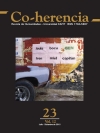Insights into pain from a phenomenological point of view
Main Article Content
Keywords
pain, body, phenomenology, medicine
Abstract
This article discusses how the phenomenology of physical pain can establish a dialogue with the medical sciences, providing, on the one hand, a theoretical framework of the mind-body relationship rather than a reductionist one and, on the other hand, some aspects that will help improve the possibility of the quantification of pain through a pain assessment test, on the basis of the refinement of subjective reports. The article is divided into three sections: (I) the phenomenological conception of pain; (II) the medical conception of pain and its relationship with phenomenology; and lastly, (III) what the finality of this relationship actually is.
Downloads
Download data is not yet available.
References
Botero, Juan (1999). “The Immediately Given as Ground and Back-ground”. En: Jean Petitot y Francisco J. Varela (eds.). Naturalizing Phe-nomenology. Issues in Contemporary and Cognitive Science (PP. 441-463). Stanford: CA: Stanford University Press.
Espinosa Almendro, Juan Manuel (2004a). “Conceptos generales”. En: Guía de buena práctica clínica en dolor y su tratamiento. Disponible en: https://goo.gl/7lEKo4
Espinosa Almendro, Juan Manuel (2004b). “Valoración clínica, medición y tipos”. En: Guía de buena práctica clínica en dolor y su tratamiento. Disponi-ble en: https://goo.gl/7lEKo4
Gallagher, Shaun y Dan Zahavi (2008). The Phenomenological Mind. An Introduction to Philosophy of Mind and Cognitive Science. Routledge: London - New York.
Gallagher, Shaun (2012). “On the possibility of naturalizing phenomeno-logy”. En: Dan Zahavi (ed.). Oxford Handbook of Contemporary Phenome-nology (pp. 70-93). Oxford: Oxford University Press.
García Baró, Miguel (2006). Del dolor, la verdad y el bien. Salamanca: Sígueme.
Geniusas, Saulius (2013). “On naturalism in pain research: a phenome-nological critique”. En: Metodo. International Studies in Phenomenology and Philosophy, Vol. 1, No.1, pp. 1-10.
Geniusas, Saulius (2012). On pain: a phenomenological critique of physica-lism. Manuscrito no publicado.
Husserl, Edmund (1986). Ideas relativas a una fenomenología pura y a una filosofía fenomenológica. México D.F.: Fondo de Cultura Económica.
Husserl, Edmund (1999). Investigaciones lógicas. Buenos Aires: Alianza Editorial.
Lutz, Antoine y Evan Thompson (2003). “Neurophenomenology Integra-ting Subjective Experience and Brain Dynamics in the Neuroscience of Consciousness”. En: Journal of Consciousness Studies, Vol. 10, No. 9-10, pp. 31-52.
Merleau Ponty, Maurice (1945). Phénoménologie de la perception. París: Gallimard.
Powell, Richard A., Julia Downing, Henry Ddungu y Faith N. Mwangi-Powell (2010). “Historia y evaluación del dolor”. En: Andreas Kopf y Ni lesh B. Patel (eds.). Guía para el manejo del dolor en condiciones de bajos recursos (pp. 67-79). Washington, DC: IASP. Disponible en: http://goo.gl/D7ePWy
Serrano de Haro, Agustín (2009). “Defensa de la perspectiva fenomeno-lógica en el análisis del dolor”. En: Pensar la compasión (pp. 161-172). Madrid: Universidad Pontificia Comillas.
Serrano de Haro, Agustín (2012). “A propósito de la fenomenología del dolor”. En: Crítica, No. 62, pp. 12-16.
Sheets Johnstone, Maxine (2009). The corporeal Turn. Charlottesville: Im-print Academic.
Traue, Harald C., Lucia Jerg-Bretzke, Michael Pfingsten y Vladimir Hrabal (2010). “Factores psicológicos en el dolor crónico”. En: Guía para el manejo del Dolor en condiciones de bajos recursos. Asociación Internacional para el Estudio del Dolor (pp. 19-26). Disponible en: http://goo.gl/D7ePWy
Torregrosa Zúñiga, Samuel y Guillermo Bugedo Tarraza (1994). “Medi-ción del dolor”. En: Boletín Escuela de Medicina, Pontificia Universidad Ca-tólica de Chile, No. 23, 155-158. Disponible en: http://goo.gl/Y4J4Ii
Varela, Francisco (1996). “Neurophenomenology: A methodological re-medy to the hard problem”. En: Journal of Consciousness Studies, Vol. 1, No. 3, pp. 330-350.
Varela, Francisco, Evan Thompson y Eleanor Rosch (2005). De cuerpo presente. Las ciencias cognitivas y la experiencia humana. Barcelona: Gedisa.
Espinosa Almendro, Juan Manuel (2004a). “Conceptos generales”. En: Guía de buena práctica clínica en dolor y su tratamiento. Disponible en: https://goo.gl/7lEKo4
Espinosa Almendro, Juan Manuel (2004b). “Valoración clínica, medición y tipos”. En: Guía de buena práctica clínica en dolor y su tratamiento. Disponi-ble en: https://goo.gl/7lEKo4
Gallagher, Shaun y Dan Zahavi (2008). The Phenomenological Mind. An Introduction to Philosophy of Mind and Cognitive Science. Routledge: London - New York.
Gallagher, Shaun (2012). “On the possibility of naturalizing phenomeno-logy”. En: Dan Zahavi (ed.). Oxford Handbook of Contemporary Phenome-nology (pp. 70-93). Oxford: Oxford University Press.
García Baró, Miguel (2006). Del dolor, la verdad y el bien. Salamanca: Sígueme.
Geniusas, Saulius (2013). “On naturalism in pain research: a phenome-nological critique”. En: Metodo. International Studies in Phenomenology and Philosophy, Vol. 1, No.1, pp. 1-10.
Geniusas, Saulius (2012). On pain: a phenomenological critique of physica-lism. Manuscrito no publicado.
Husserl, Edmund (1986). Ideas relativas a una fenomenología pura y a una filosofía fenomenológica. México D.F.: Fondo de Cultura Económica.
Husserl, Edmund (1999). Investigaciones lógicas. Buenos Aires: Alianza Editorial.
Lutz, Antoine y Evan Thompson (2003). “Neurophenomenology Integra-ting Subjective Experience and Brain Dynamics in the Neuroscience of Consciousness”. En: Journal of Consciousness Studies, Vol. 10, No. 9-10, pp. 31-52.
Merleau Ponty, Maurice (1945). Phénoménologie de la perception. París: Gallimard.
Powell, Richard A., Julia Downing, Henry Ddungu y Faith N. Mwangi-Powell (2010). “Historia y evaluación del dolor”. En: Andreas Kopf y Ni lesh B. Patel (eds.). Guía para el manejo del dolor en condiciones de bajos recursos (pp. 67-79). Washington, DC: IASP. Disponible en: http://goo.gl/D7ePWy
Serrano de Haro, Agustín (2009). “Defensa de la perspectiva fenomeno-lógica en el análisis del dolor”. En: Pensar la compasión (pp. 161-172). Madrid: Universidad Pontificia Comillas.
Serrano de Haro, Agustín (2012). “A propósito de la fenomenología del dolor”. En: Crítica, No. 62, pp. 12-16.
Sheets Johnstone, Maxine (2009). The corporeal Turn. Charlottesville: Im-print Academic.
Traue, Harald C., Lucia Jerg-Bretzke, Michael Pfingsten y Vladimir Hrabal (2010). “Factores psicológicos en el dolor crónico”. En: Guía para el manejo del Dolor en condiciones de bajos recursos. Asociación Internacional para el Estudio del Dolor (pp. 19-26). Disponible en: http://goo.gl/D7ePWy
Torregrosa Zúñiga, Samuel y Guillermo Bugedo Tarraza (1994). “Medi-ción del dolor”. En: Boletín Escuela de Medicina, Pontificia Universidad Ca-tólica de Chile, No. 23, 155-158. Disponible en: http://goo.gl/Y4J4Ii
Varela, Francisco (1996). “Neurophenomenology: A methodological re-medy to the hard problem”. En: Journal of Consciousness Studies, Vol. 1, No. 3, pp. 330-350.
Varela, Francisco, Evan Thompson y Eleanor Rosch (2005). De cuerpo presente. Las ciencias cognitivas y la experiencia humana. Barcelona: Gedisa.




